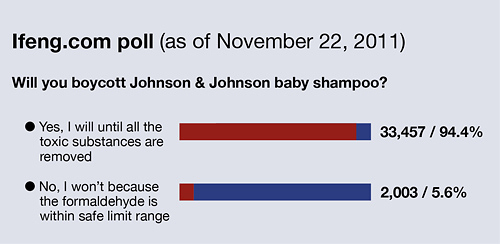|
Johnson & Johnson has issued 22 recalls since September 2009, none of which affected the Chinese market. More Chinese consumers are condemning Johnson & Johnson for its "double standards" in different markets.
Johnson & Johnson clearly can make safer baby shampoo in all the markets around the world, but it's not doing it, said Lisa Archer, Director of the Campaign for Safe Cosmetics, to the Associated Press.
In response, Johnson & Johnson insisted that it is recalling problematic products in overseas markets not related to China since over-the-counter medicines sold in the Chinese market were all produced in its factory in Shanghai.
Industry analysts hold different views in that when it comes to product recalls, quality standards, no matter where it is produced, should be the determinant. Obviously, differentiated treatment of recalling in different countries shows that Johnson & Johnson is using a double standard.
In 2005, its baby oil was accused of containing paraffin wax which is harmful to human health. After that Johnson & Johnson insisted that the paraffin wax was within the scope of China's national standard.
"The toxic substances that are not allowed in other countries were used by Johnson & Johnson in China. Obviously, it is problematic. We Chinese are the same humans as those in other countries, so why are we allowed to use products produced under different quality standards?" Zhang said.
Today, more Chinese consumers care about their health and avoid using cosmetic products with strong scents, colors or long shelf lives. The contents of Johnson & Johnson's products should change to comply with domestic habits.
Johnson & Johnson said in an earlier statement that it was also working to develop different baby product formulae, including ones that contain non-formaldehyde-releasing preservatives.
With the rapid economic development, more and more Chinese consumers focus on social responsibilities of a company, while Johnson & Johnson can't make an exception in the Chinese case.
A company should stick to a unified global standard for its products. This is not only a basic philosophy in production, but also shows the integrity of a global brand.
Accusations over Johnson & Johnson's differentiated quality standards in different countries also raised calls for a higher national quality standard among Chinese consumers. Zhang and other Chinese customers continue to question the safety of quaternium-15. Since quaternium-15 and dioxane have been widely used in cosmetics and baby products in China, should the country scrutinize the safety of these products?
"There are many different materials available as bath foam ingredients. The one containing dioxane is just one choice. Technically speaking, producing safer products is completely possible for Johnson & Johnson, said Dong Jinshi, Executive Vice President of International Food Packaging Association. "The problem is whether it is willing to do so, because it means higher costs."
Dong laid the hopes of safer quality on higher national standards.
"It is not realistic for enterprises to improve their quality standards out of their own will because of the cost. The way out is improving mandatory quality standards," Dong said.
Average Chinese customers put the blame on quality watchdogs.
"I wish China would adopt higher quality standards," Zhang said.
The absence of social organizations to protect customer interests in China is also considered a reason why China lags far behind other countries, like the United States, in quality supervision.
"The United States has a complete legal and social system for protecting customers' interests, especially independent and non-governmental organizations. They find clues of those harmful products and dig into it and even sue the producers. If China has enough social organizations of this kind, its food and drug safety problem will be much easier to deal with," said China Youth Daily.

| 